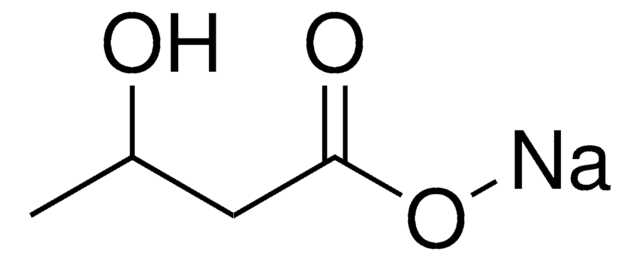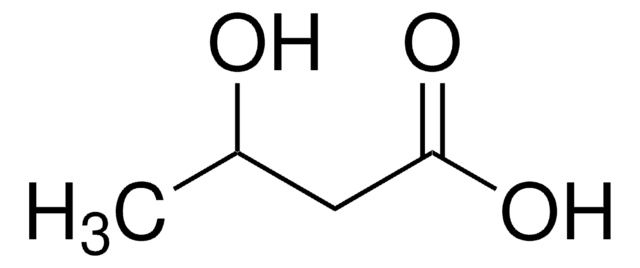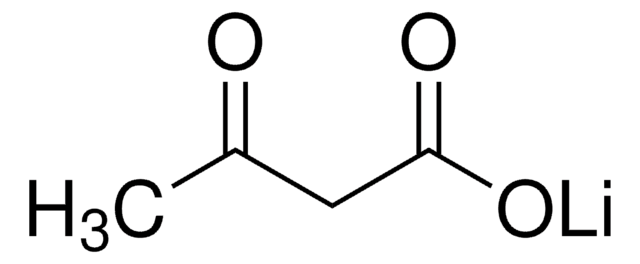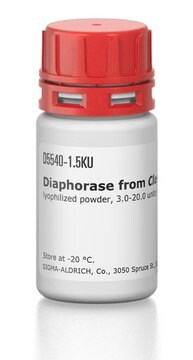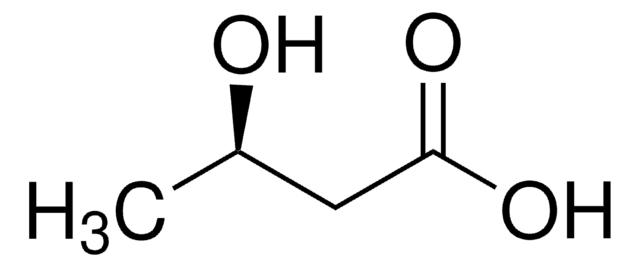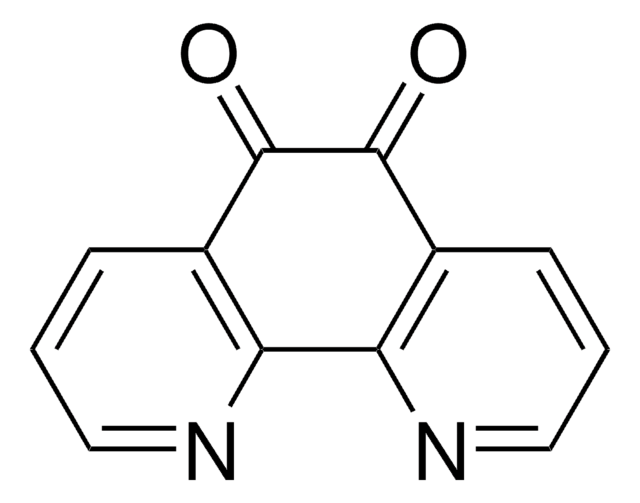H8509
β-Hydroxybutyrate Dehydrogenase from Rhodopseudomonas sphaeroides
Type V, lyophilized powder, 250-750 units/mg protein
Sinonimo/i:
(R)-3-Hydroxybutanoate:NAD+ oxidoreductase, 3-HBDH
Autenticatiper visualizzare i prezzi riservati alla tua organizzazione & contrattuali
About This Item
Prodotti consigliati
Tipo
Type V
Livello qualitativo
Stato
lyophilized powder
Attività specifica
250-750 units/mg protein
Purificato mediante
chromatography
Attività estranea
lactate dehydrogenase ≤0.05%
malate dehydrogenase ≤0.1%
Temperatura di conservazione
−20°C
Cerchi prodotti simili? Visita Guida al confronto tra prodotti
Applicazioni
Suitable for the determination of acetoacetate and D(-)-3-hydroxybutyrate by the method of Williamson, D. H., and Mellanby, J., Methods of Enzymatic Analysis, Bergmeyer, H., ed., 2nd edition, 4, 1836 (1974).
Azioni biochim/fisiol
In mammalian systems, β-hydroxybutyrate dehydrogenase is localized on the inner mitochondrial membrane and requires phosphatidyl choline for activity. In contrast, the enzyme from Rhodopseudomonas is a soluble cytosolic enzyme that does not require a phospholipid allosteric activator. The enzyme is required for the utilization of ketone bodies as a source of metabolic energy. It catalyzes the oxidation of 3-hydroxybutyrate to acetoacetate, the first step in the conversion of ketone bodies to citric acid, which is then further metabolized via the tricarboxylic acid cycle (Krebs cycle).
Definizione di unità
One unit will oxidize 1.0 μmole of D-β-hydroxybutyrate to acetoacetate per min at pH 7.8 at 37 °C.
Stato fisico
Lyophilized powder containing Tris buffer salts
Codice della classe di stoccaggio
10 - Combustible liquids
Classe di pericolosità dell'acqua (WGK)
WGK 3
Punto d’infiammabilità (°F)
Not applicable
Punto d’infiammabilità (°C)
Not applicable
Dispositivi di protezione individuale
Eyeshields, Gloves, multi-purpose combination respirator cartridge (US)
Scegli una delle versioni più recenti:
Possiedi già questo prodotto?
I documenti relativi ai prodotti acquistati recentemente sono disponibili nell’Archivio dei documenti.
I clienti hanno visto anche
Michel A Sciotti et al.
Chimia, 64(11), 793-798 (2011-01-05)
Gamma hydroxybutyric acid (GHB) is a regulated therapeutic drug, which naturally occurs in mammalian brain tissues as an intermediate of the GABA (gamma aminobutyric acid) neurotransmitter metabolism. The increasing misuse of GHB as a narcotic or abusing drug in recent
Jörn Oliver Sass
Journal of inherited metabolic disease, 35(1), 23-28 (2011-04-12)
Ketone bodies acetoacetate and 3-hydroxy-n-butyric acid are metabolites derived from fatty acids and ketogenic amino acids such as leucine. They are mainly produced in the liver via reactions catalyzed by the ketogenic enzymes mitochondrial 3-hydroxy-3-methylglutary-coenzyme A synthase and 3-hydroxy-3-methylglutary-coenzyme A
Yanfeng Zhang et al.
Acta biochimica et biophysica Sinica, 43(12), 996-1002 (2011-11-01)
Succinic semialdehyde reductase (SSAR) is an important enzyme involved in γ-aminobutyrate (GABA) metabolism. By converting succinic semialdehyde (SSA) to γ-hydroxybutyrate (GHB), the SSAR facilitates an alternative pathway for GABA degradation. In this study, we identified SSARs from Geobacter sulfurreducens and
Dominik R Weiss et al.
Clinical laboratory, 57(7-8), 523-526 (2011-09-06)
For intrauterine transfusion and some other rare indications, irradiation and washing or adjustment to an elevated haematocrit is necessary. No data are currently available indicating whether irradiation of red blood cell concentrates (RBCs) might impair the mechanical stability of erythrocytes
J M Villarreal et al.
Microbiology (Reading, England), 157(Pt 3), 636-647 (2010-12-15)
Salmonella enterica serovar Typhi (S. Typhi) is the aetiological agent of typhoid fever in humans. This bacterium is also able to persist in its host, causing a chronic disease by colonizing the spleen, liver and gallbladder, in the last of
Il team dei nostri ricercatori vanta grande esperienza in tutte le aree della ricerca quali Life Science, scienza dei materiali, sintesi chimica, cromatografia, discipline analitiche, ecc..
Contatta l'Assistenza Tecnica.

